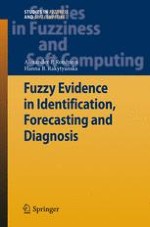2012 | OriginalPaper | Buchkapitel
Inverse Inference Based on Fuzzy Rules
verfasst von : Alexander P. Rotshtein, Hanna B. Rakytyanska
Erschienen in: Fuzzy Evidence in Identification, Forecasting and Diagnosis
Verlag: Springer Berlin Heidelberg
Aktivieren Sie unsere intelligente Suche, um passende Fachinhalte oder Patente zu finden.
Wählen Sie Textabschnitte aus um mit Künstlicher Intelligenz passenden Patente zu finden. powered by
Markieren Sie Textabschnitte, um KI-gestützt weitere passende Inhalte zu finden. powered by
The wide class of the problems, arising from engineering, medicine, economics and other domains, belongs to the class of inverse problems [1]. The typical representative of the inverse problem is the problem of medical and technical diagnosis, which amounts to the restoration and the identification of the unknown causes of the disease or the failure through the observed effects, i.e. the symptoms or the external signs of the failure. The diagnosis problem, which is based on a cause and effect analysis and abductive reasoning can be formally described by neural networks [2] or Bayesian networks [3, 4]. In the cases, when domain experts are involved in developing cause-effect connections, the dependency between unobserved and observed parameters can be modelled using the means of fuzzy sets theory [5, 6]: fuzzy relations and fuzzy IF-THEN rules. Fuzzy relational calculus plays the central role as a uniform platform for inverse problem resolution on various fuzzy approximation operators [7, 8]. In the case of a multiple variable linguistic model, the cause-effect dependency is extended to the multidimensional fuzzy relational structure [6], and the problem of inputs restoration and identification amounts to solving a system of multidimensional fuzzy relational equations [9, 10]. Fuzzy IF-THEN rules enable us to consider complex combinations in cause-effect connections as being simpler and more natural, which are difficult to model with fuzzy relations. In rule-based models, an inputs-outputs connection is described by a hierarchical system of simplified fuzzy relational equations with max-min and dual min-max laws of composition [11 – 13].
